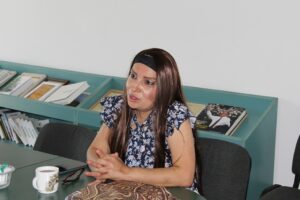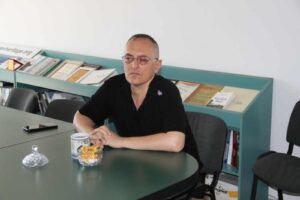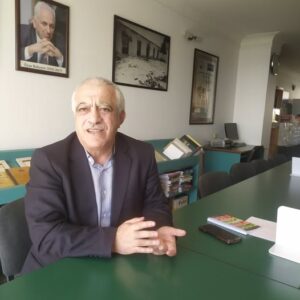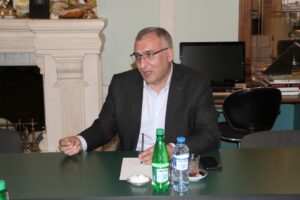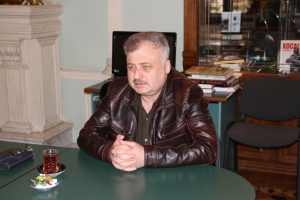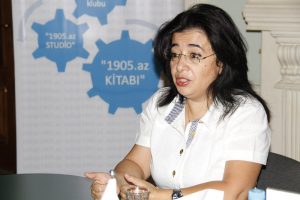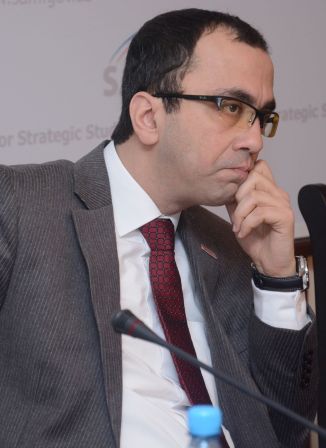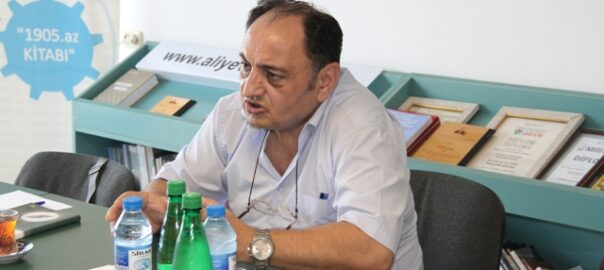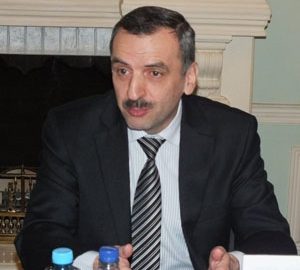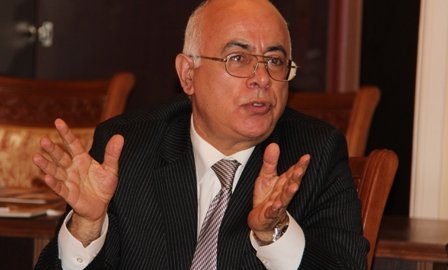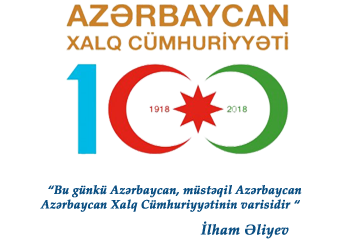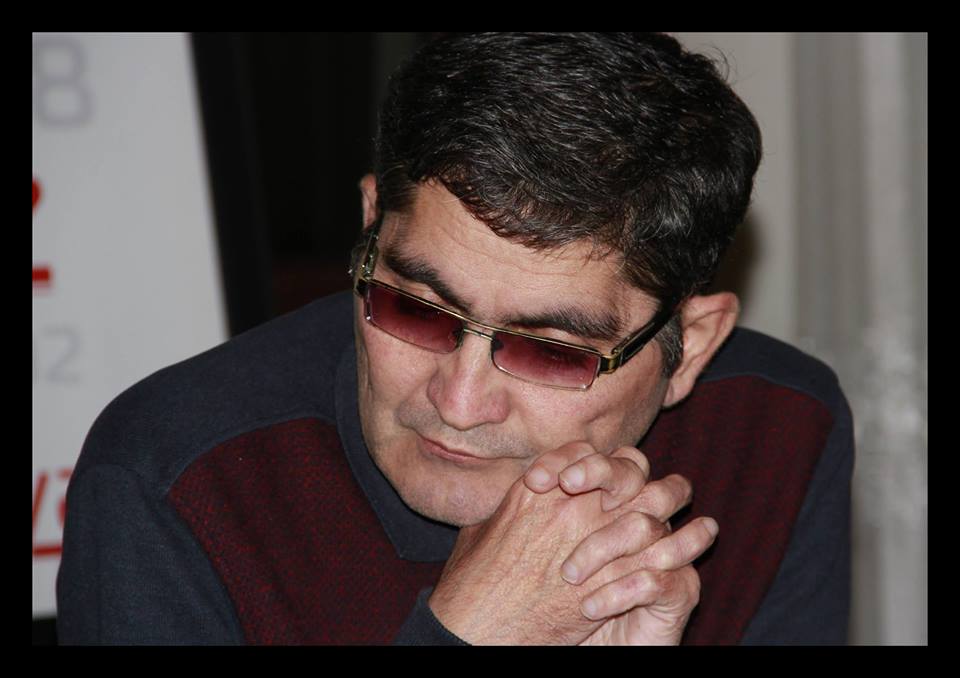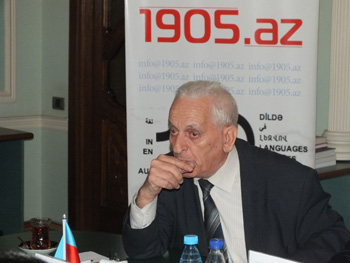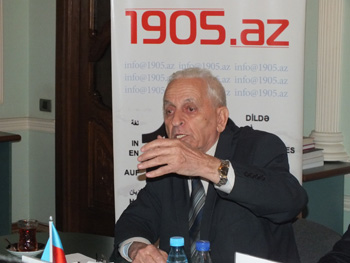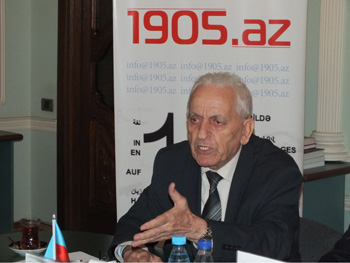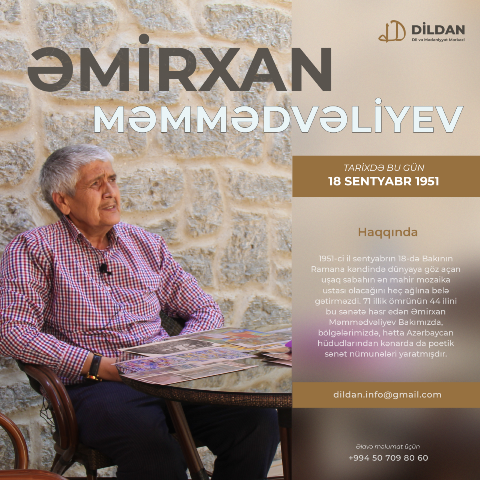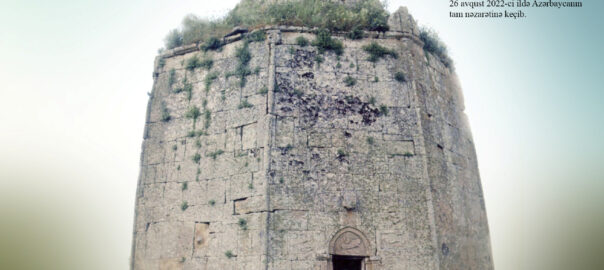3.7. Suspicious collaboration between OSCE/ODIHR and George Soros
In 2008, the OSCE/ODIHR Election Observation Mission (EOM) consisted of a main team of 12 international experts stationed at the Baku head office, and a team of 28 long-term observers deployed in the regions.
The majority of the EOM observers were sent from 23 OSCE member states, mainly from the “western Vienna”, where the OSCE headquarters are located. Only 2 years later – in 2010, the OSCE/ODIHR EOM consisted of a main team of 15 people and a team of 22 long-term observers. During the 2013 elections, EOM was made up of a team of 15 people and 30 long-term observers.
In the 11 April 2018 presidential election, the OSCE/ODIHR EOM was represented by a main team of 11 experts and in all 28 long-term observers. Another noteworthy point is that more observers were sent to Azerbaijan with 9.5m population than to the United States with a population of 325 million. The logical question arises is why the OSCE/ODIHR send 28 long-term observers to observe elections in Azerbaijan and only 26 experts to the United States, whose population is 35 times more than Azerbaijan. When a team of 13 observers was sent to the U.S. presidential elections in 2016, what was the aim of sending more observers to Azerbaijan for the latest presidential elections?
Sweden, Norway, Denmark, the U.S., the United Kingdom, Germany and Switzerland always send election observers to Azerbaijan within the OSCE/ODIHR’s EOM and the representatives of these countries often demonstrate biased position against Azerbaijan in the organizations, such as the OSCE and the Council of Europe. Therefore, the methodology of the OSCE/ ODIHR results in the double standards, as well as the merger of EOMs from “western Vienna” in a single center.
Moreover, the absence of a method and the very high number of international observers coming to Azerbaijan to observe the elections reveal aims behind the observation missions of the OSCE/ODIHR. The willingness of the OSCE/ODIHR to send more observers to Azerbaijan indicates that openly politicized approach is prepared beforehand in order to form the situation from inside with external means.
And this indicates that the leadership of the OSCE/ODIHR, which is under the influence of certain circles, deliberately politicizes the monitoring of elections in order to put forward groundless allegations against Azerbaijan after the elections.
As is known, the key role of the OSCE/ODIHR was defined in accordance with the Helsinki Document adopted in 1992. Under this document, the major role of the OSCE/ODIHR is to assist the member states in fulfilling their commitments in the sphere of human rights. However, abusing its competences in observing the elections in Azerbaijan, this institution exceeded its mandate and took politically motivated decisions.
We all know that the OSCE/ODIHR was established in 1991. Currently, over 180 staff members from 35 countries are employed by this institution. The activities of the ODIHR are funded from the main budget adopted by member states annually, as well as, by voluntary donations.
Analyses show that since 2008, all directors of the ODIHR were connected to the Soros Foundation, which serves to the global U.S. supremacy through destabilization of stability in other countries by means of globalization, or they, at least, made great efforts to conspire with this network.
Janez Lenarčič (Slovenia) was the director of the OSCE/ODI HR in 2008-2014. In this position, he was replaced by Michael Georg Link (Germany) in 2014-2017. Ingibjörg Sólrứn Gisladóttir (Iceland) has been director of ODIHR since 2017.
While analyzing the presence of any ties between the ODIHR leadership and individuals related to George Soros’ NGOs, as well as the existence of any coordination between them, it be comes dear that Ambassador Janez Lenarčič, who was the director of ODIHR in 2008-2014, maintain personal relationship with George Soros, and his most reliable employee in Europe is Gerald Knaus, Director of the European Stability Initiative (ESI). ESI is financed by Soroś, belongs to the Open Society Institution, and dedicated its activities to the criticism of the Azerbaijani government in order to undermine the stability in Azerbaijan.
It is common that the interference of the Open Society Foundations, formerly the Open Society Institute, in the election process in the former Soviet republics stimulated several public movements and this reached its culmination with the overthrow of unfriendly to Soros countries’ leaders through “color revolutions”.
- • Supporting civil society organizations for a long time to form personnel consisting of activists;
- • Providing political movements in progress with money and experience;
- • Holding negotiations with Western governments on behalf of activists;
- • Providing reformists coming to power with support after elections.
The Open Society Foundations participated in most of the fundamental changes in the region. It is suffice to name countries, such as Slovakia (1998-1999), Croatia (1999-2000), Serbia (2000), Georgia (2003-2004), Ukraine (2004, 2014) and Kyrgyzstan (2005). The Open Society Foundations also rendered financial assistance to a number of NGOs acting as local actors ahead of the elections in the region and these organizations operated to realize Soros’ interests.
As I have already mentioned, Michael Georg Link from Germany held the position of Director of the ODIHR in 2014-2017 after Ambassador Lenarčič. Michael Georg Link was elected to the German parliament as a member of the Free Democratic Party from Heilbronn/Baden-Wiirttemberg, and kept the mandate until 2013. During that time (2006-2013), Link established strong relationship with the OSCE as a member of the OSCE Parliamentary Assembly. He was the minister of state for Europe in the German government from January 2012 to December 2013 and was responsible for the issues of the OSCE, the EU, the Council of Europe and NATO.
Michael Georg Link is a former chairman of the supervisory board of the Centre for International Peace Operations (ZIF). The Centre for International Peace Operations is an important Organization in Germany dedicating its activity to the electoral matters among others. Michael Georg and Gerald Knaus repeatedly met and held numerous meetings at the institutions, such as the OSCE and the Council of Europe with fierce critics of the Azerbaijani government.
ZlF is an institution that enjoys big influence in the OSCE/ ODIHR. For example, ZlF organized an event to discuss the work of the election observation missions in 2014. The panel featured Soros’ anti-Azerbaijani employee Gerald Knaus; Head of Policy Planning Staff at the German Federal Foreign Office, Tomas Bagger; Deputy Head of the OSCE/ODIHR Election Department Nicola Schmidt; and socialist MP Christoph Strasser, the Commissioner for Human Rights Policy and Humanitarian Aid of the German Government, who has always been very critical of Azerbaijan in the Parliamentary Assembly of the Council of Europe. The moderator of the event was Vibke Hansen, Director of ZIF.
At the event, Gerald Knaus made open suggestions regarding the work of the OSCE/ODIHR, underlined the need for strengthening the organization and resolutely explained the difference between long-term professional missions and opinion-driven short-term (political) missions. During the debate, Strasser agreed that it was a good idea to reduce the parliamentary missions and instead to strengthen long-term professional missions. Knaus added that the parliamentarians had to continue monitoring, but they should not issue an assessment on behalf of the “delegation” based on the short-term basis. Furthermore, Knaus recommended that the ODIHR should certify the local monitoring organizations (their independence will be retained) in order to distinguish them from political parties and the pro-government organizations.
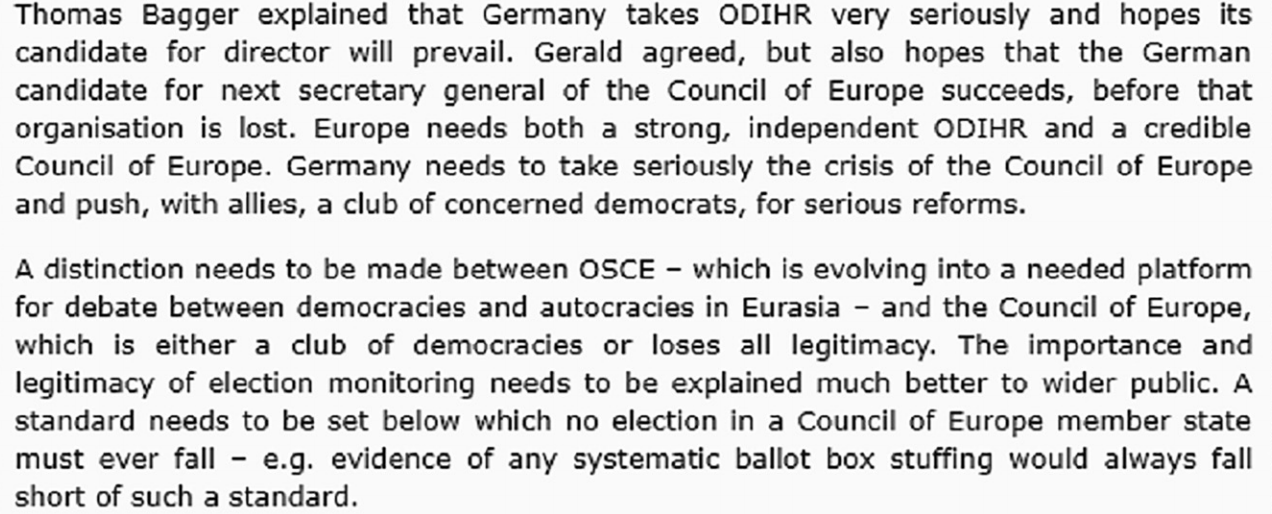
There is considerable evidence that the Open Society Foundations has been influencing ODİHR’s activities for years without informing the government properly of the lobbying activities. At this point, it would be a truly evident occurrence that these two institutions, having numerous relations with each other and a lot of information about what others do and work hard for the same purpose, cannot find a way to cooperate.
Michael Georglink was the Director of OSCE/ODIHR, which cancelled the mission to observe the parliamentary elections in Azerbaijan in 2015 in order to delegitimize the government of Azerbaijan. He said: “The insistence of the Azerbaijani authorities on a restricted number of the observers directly contradicts the country’s commitments before the OSCE and the election observation mandate of the ODIHR”.
We should also note that when the director of the OSCE/ODI HR, Michael Georg Link, played an active role in the relations with PACE inorder to influence the election observations of the Council of Europe and succeeded in reducing the relevance of the short-term observation missions.
Ingibjörg Sólrứn Gisladóttir from Iceland assumed the mandate as the Director of the OSCE/ODIHR in June 2017. Gisladóttir replaced Michael Georg Link of Germany. Before becoming the Director of the ODİHR, from 2014 Gfslad6ttir served as Regional Director for Europe and Central Asia at UN Women, and Country Representative to Turkey. She worked as a Country Representative of this Committee for Afghanistan in 2011-2014. The position of the OSCE/ODIHR on the 11 April 2018 presidential elections in Azerbaijan demonstrated that this institution under the leadership of Ingibjörg Sólrứn Gisladóttir will take no steps to increase reliability or eliminate the application of double standards to the countries, such as Azerbaijan.


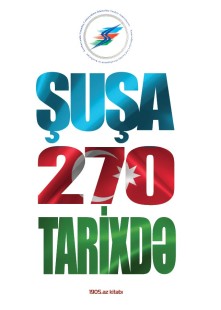
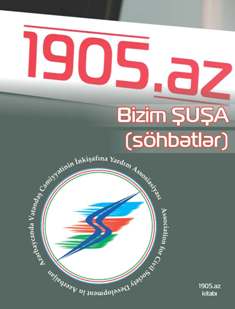
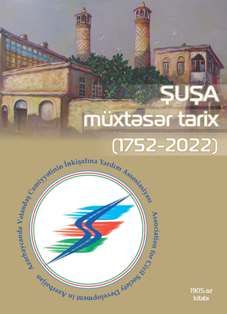
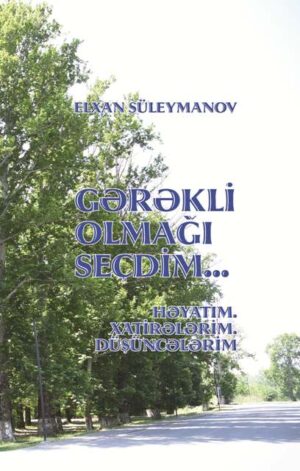
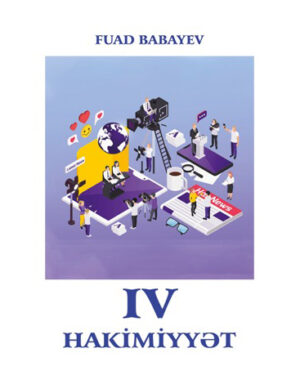
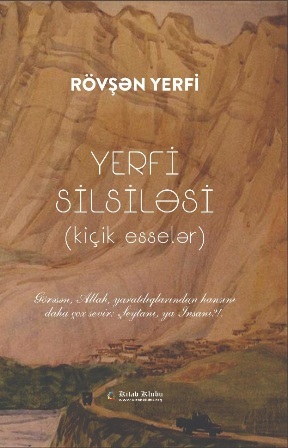
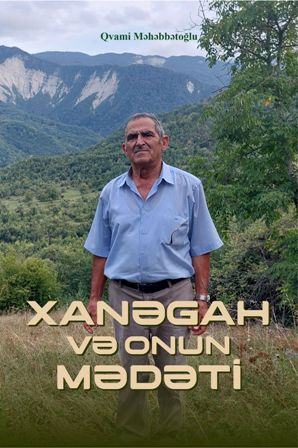







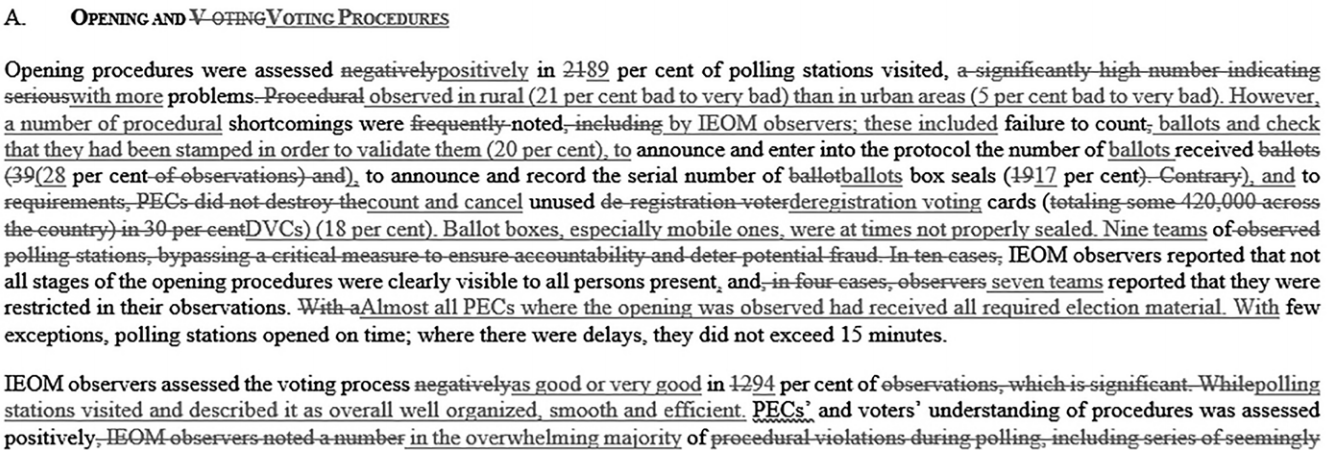



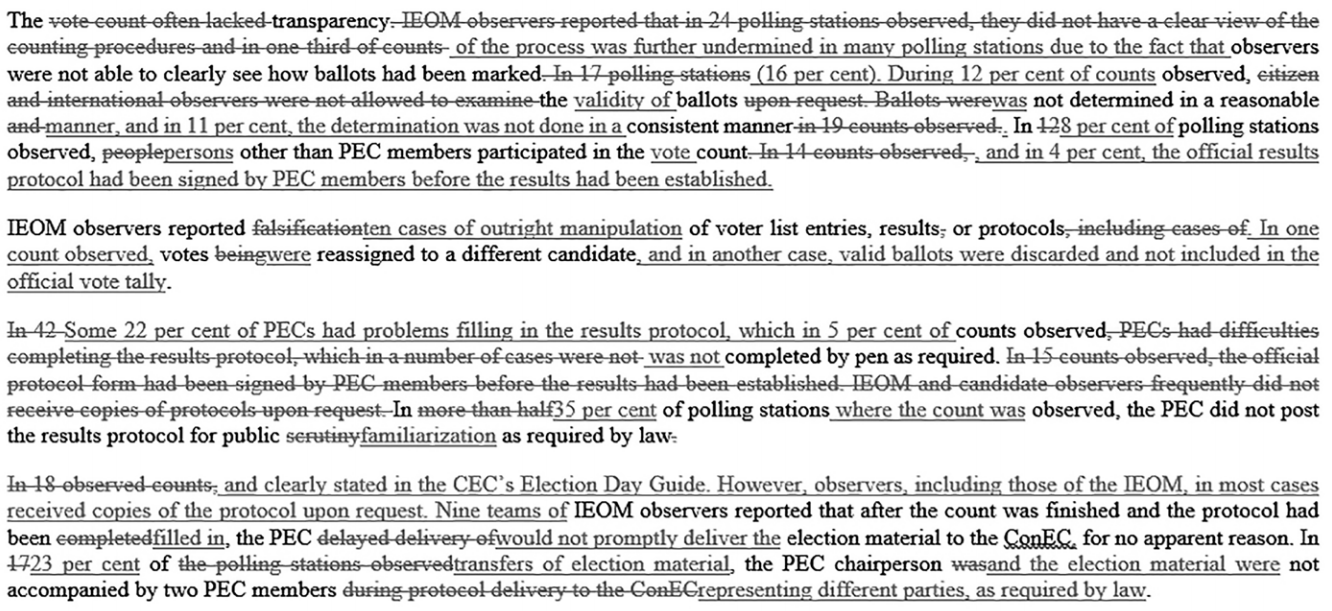




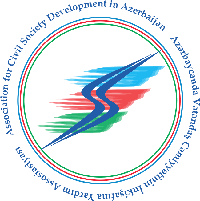
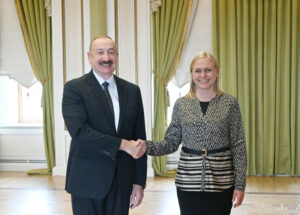 Prezident İlham Əliyev ATƏT-in fəaliyyətdə olan sədrinin başçılıq etdiyi nümayəndə heyətini qəbul edib VIDEO
Prezident İlham Əliyev ATƏT-in fəaliyyətdə olan sədrinin başçılıq etdiyi nümayəndə heyətini qəbul edib VIDEO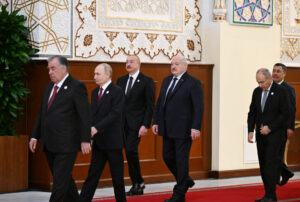 Prezident İlham Əliyev Düşənbədə MDB Dövlət Başçıları Şurasının məhdud tərkibdə iclasında çıxış edib
Prezident İlham Əliyev Düşənbədə MDB Dövlət Başçıları Şurasının məhdud tərkibdə iclasında çıxış edib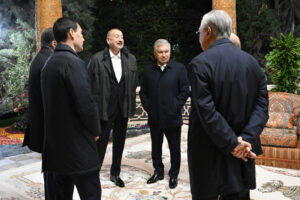 Prezident İlham Əliyev Düşənbədə MDB dövlət başçılarının qeyri-rəsmi şam yeməyində iştirak edib VİDEO
Prezident İlham Əliyev Düşənbədə MDB dövlət başçılarının qeyri-rəsmi şam yeməyində iştirak edib VİDEO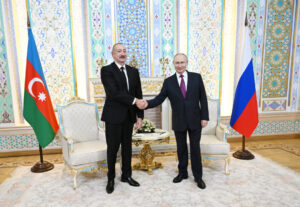 Düşənbədə Azərbaycan Prezidenti İlham Əliyevin Rusiya Prezidenti Vladimir Putin ilə təkbətək görüşü olub VIDEO
Düşənbədə Azərbaycan Prezidenti İlham Əliyevin Rusiya Prezidenti Vladimir Putin ilə təkbətək görüşü olub VIDEO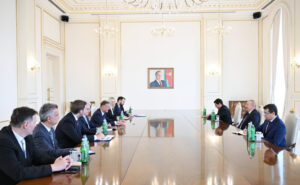 Prezident İlham Əliyev Xorvatiya parlamentinin nümayəndə heyətini qəbul edib VİDEO
Prezident İlham Əliyev Xorvatiya parlamentinin nümayəndə heyətini qəbul edib VİDEO